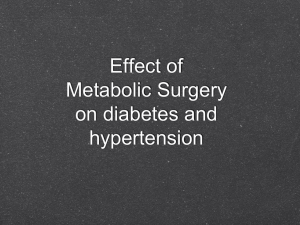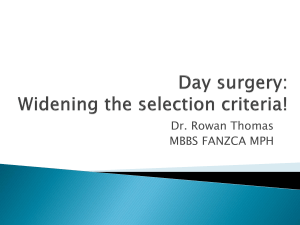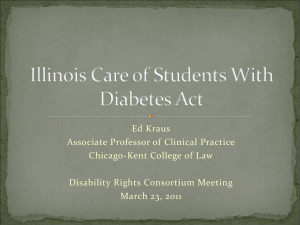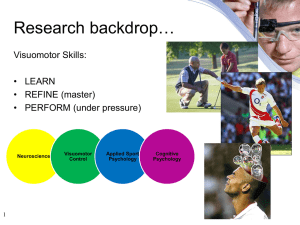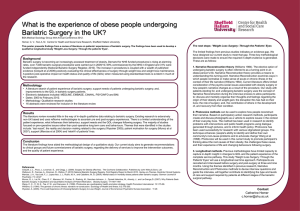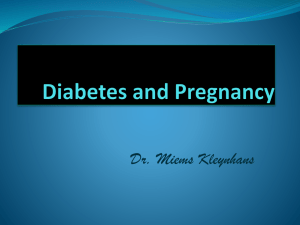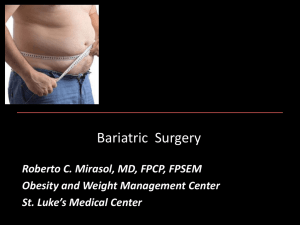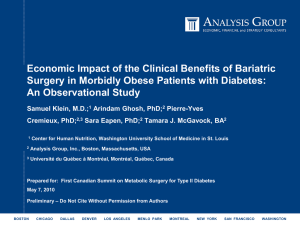the Power Point Slides
advertisement
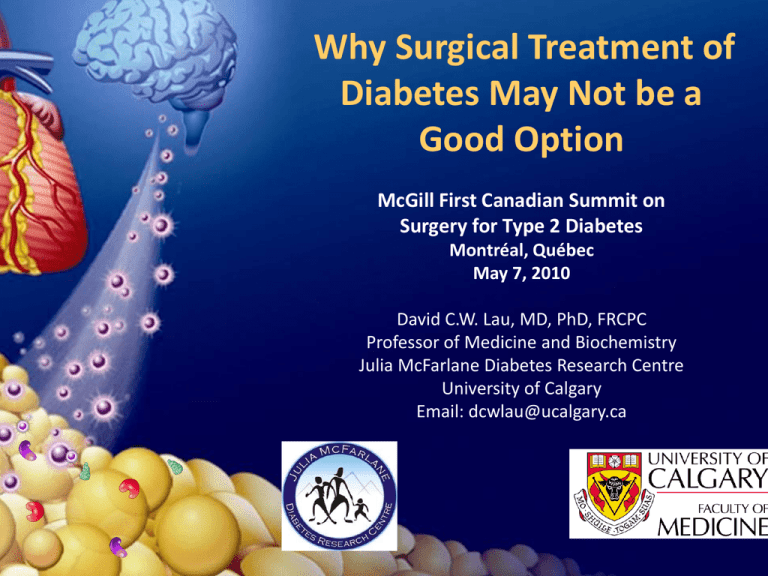
Why Surgical Treatment of Diabetes May Not be a Good Option McGill First Canadian Summit on Surgery for Type 2 Diabetes Montréal, Québec May 7, 2010 David C.W. Lau, MD, PhD, FRCPC Professor of Medicine and Biochemistry Julia McFarlane Diabetes Research Centre University of Calgary Email: dcwlau@ucalgary.ca Disclosures • Research funding: CIHR, AHFMR, Alberta Cancer Board, AstraZeneca, BMS, Dainippon, GSK, Eli Lilly, Pfizer and sanofi-aventis • Consultant or advisory board member: Abbott, Allergan, AstraZeneca, Bayer, BoehringerIngelheim, GSK, Eli Lilly, Merck, Novartis, Novo Nordisk, Pfizer, Roche, sanofi-aventis, Sepracor • Speaker bureau: CDA, HSFC, AstraZeneca, Abbott, Bayer, BoehringerIngelheim, Eli Lilly, GSK, Merck, Novo Nordisk, Pfizer sanofi-aventis and Sepracor Questions • How effective is bariatric surgery in treating diabetes? • Are all procedures equally effective? • What is the durability of diabetes remission? • Is bariatric surgery safe? • What are the short- and long-term complications? • Is bariatric surgery cost effective? Bariatric Surgery Decreases Type 2 Diabetes 100% 87.0% Controls % Type 2 Diabetes 80% Gastric bypass 60% 40% 20% 8.6% 0% 6 - 9 yr follow-up MacDonald et al J Gastrointest Surg 1997;1:213-220 Lap Adjustable Gastric Banding for Diabetes First randomized controlled trial comparing surgically induced weight loss with conventional therapy •N=60; 28 men, 32 women •Mean age ~47 years •Recently diagnosed Type 2 Diabetes (< 2 years) •Wt 106 kg, WC 115 cm •BMI 37.1 kg/m2 •A1C ~7.7%, FPG 8.7 mM Dixon, JB et al. JAMA 2008;299:316-323 Bariatric Surgery: Weight Loss and Diabetes Remission Surgery (N=30) Control (N=30) Remission in % (N) 73% (22/30) 13% (4/30) Achieving A1C < 6.2% in % 80% (N=24) 20% (N=6) 4 28 Weight loss (mean±SD) in % 20±9.4 1.4±4.9 Excess wt loss (mean±SD) % 62.5 4.3 Change in BMI (kg/m2) - 7.4 - 1.5 Medication use (N) Dixon, JB et al. JAMA 2008;299:316-323 Weight Loss and Diabetes at 2 Years • Remission occurred > 6 months postsurgery • 10% body weight loss generally required for diabetes remission, which was achieved in 22 of surgical patients • 4/26 patients who lost > 10% body weight failed to achieved remission Dixon, JB et al. JAMA 2008;299:316-323 Weight Loss and Diabetes Remission Systematic Analysis of 621 studies, N=135,246 Mean age 40.2 years; BMI 47.9 kg/m2; 80% women Total LAGB Gastrop G Bypass BPD/DS % EBWL 55.9 46.2 55.5 59.7 63.6 % “Cure” 78.1 56.7 79.7 80.3 95.1 % < 2 yrs 80.3 55.0 81.4 81.6 94.0 % ≥ 2 yrs 74.6 58.3 77.5 70.9 95.9 Buchwald H et al. Am J Med 2009;122:248-256 How effective is bariatric surgery in treating diabetes? • Yes, it is effective with a remission rate is about 84% but no long-term data • No data on subjects with longer duration of diabetes • Results likely vary with less experienced surgical teams • No long term data on efficacy of surgery • Not a cure for diabetes Hormonal Mechanisms of Weight loss • Weight dependent effects on glucose homeostasis • Multiple hypotheses (foregut, hindgut, ghrelin etc.) on weight independent anti-diabetic effects of RYGB but detailed mechanisms remain unknown • Gut hormones (GLP-1, ghrelin, PYY and oxyntomodulin) likely play an important role • Increased but usually appropriate GLP-1 response with Roux-en-Y gastric bypass (RYGB) surgery • Insulin hypersecretion and insulin resistance are normalized following malabsorptive bariatric surgery Hormonal Changes Associated with Bariatric Surgical Procedures Frühbeck G et al. N Engl J Med 2004;350:308-309 What are the short- and long-term complications? Complications • Operative risks, morbidity and mortality • Post-op and short-term mortality 0.1-0.33% for LAGB 0.5% for gastric bypass surgery • Long-term Nutrient and vitamin deficiencies Malabsorption Obstruction Dumping syndrome Hypoglycemia Nesidioblastosis and Hypoglycemia • 5 women and 1 man (median age 47 years; range, 39 to 54) with postprandial symptoms of neuroglycopenia developed 12 years post-surgery • Postprandial hyperinsulinemic hypoglycemia and nesidioblastosis were confirmed in 4 patients and islet cell tumors in 2 patients; all underwent partial pancreatectomy • Increased levels of a β-cell trophic polypeptide, such as glucagon-like peptide 1, may contribute to the hypertrophy of pancreatic beta cells in these 6 patients Service GJ, et al N Engl J Med 2005;353:249-254 Bariatric Surgery for Diabetes Advantages Disadvantages • Effective and sustained long-term weight loss > 10% • More patients achieve glycemic and metabolic goal targets • Reduction in anti-diabetic medications • No hypoglycemia • May be cost-effective • Surgical complications (short- and long-term) • Remission not achieved in all patients who achieved > 10% wt loss • Long surgical wait list • Requires long-term followup • Long-term efficacy and safety data not available Questions • How effective is bariatric surgery in treating diabetes? • Are all procedures equally effective? • What is the durability of diabetes remission? • What are the short- and long-term complications? • Is bariatric surgery safe? • Access to surgery is a big barrier with long wait times • Is bariatric surgery cost effective? Patient Selection, Benefits and Complications of Bariatric Surgery Obesity Diabetes Co-Morbidities Operative Risks Obesity Surgery Benefits: - Weight loss - Metabolic improvements - Mortality benefit Complications: - Nutrient deficiency - Dumping syndrome - Hypoglycemia Frachetti KL, et al. Curr Opin Endocrinol Diabetes Obes. 2009;16:119-124 Is bariatric surgery for the treatment of type 2 diabetes an option? • Not quite ready for prime time • Needs more research and clinical trial data Thank you Questions?
